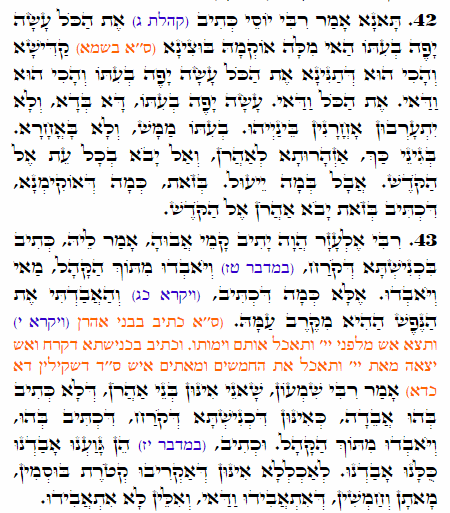Daily Zohar # 2114 – Acharei Mot – But his hand dried up

.
Hebrew translation:
43. רַבִּי אֶלְעָזָר הָיָה יוֹשֵׁב לִפְנֵי אָבִיו. אָמַר לוֹ, כָּתוּב בַּעֲדַת קֹרַח, וַיֹּאבְדוּ מִתּוֹךְ הַקָּהָל. מַה זֶּה וַיֹּאבְדוּ? אֶלָּא כְּמוֹ שֶׁכָּתוּב, (במדבר טז) וְהַאֲבַדְתִּי אֶת הַנֶּפֶשׁ הַהִיא מִקֶּרֶב עַמָּהּ. (כָּתוּב בִּבְנֵי אַהֲרֹן, (שם י) וַתֵּצֵא אֵשׁ מִלִּפְנֵי ה’ וַתֹּאכַל אוֹתָם וַיָּמֻתוּ. וְכָתוּב בַּעֲדַת קֹרַח, וְאֵשׁ יָצְאָה מֵאֵת ה’ וַתֹּאכַל אֶת הַחֲמִשִּׁים וּמָאתַיִם אִישׁ. הֲיַעֲלֶה בְדַעְתְּךָ שֶׁשְּׁקוּלִים אֵלֶּה כְּאֵלֶּה?!) אָמַר רַבִּי שִׁמְעוֹן, שׁוֹנִים בְּנֵי אַהֲרֹן, שֶׁלֹּא כָתוּב בָּהֶם אֲבֵדָה כְּאוֹתָם שֶׁל עֲדַת קֹרַח שֶׁכָּתוּב בָּהֶם, וַיֹּאבְדוּ מִתּוֹךְ הַקָּהָל, וְכָתוּב (במדבר יז) הֵן גָּוַעְנוּ אָבַדְנוּ כֻּלָּנוּ אָבָדְנוּ. לְהַכְלִיל אֶת אוֹתָם שֶׁהִקְרִיבוּ קְטֹרֶת בְּשָׂמִים, מָאתַיִם וַחֲמִשִׁים שֶׁאָבְדוּ וַדַּאי, וְאֵלֶּה (נָדָב וַאֲבִיהוּא) לֹא אָבְדוּ.
.
Zohar Acharei Mot
Rabbi Elazar, the son of Rabbi Shimon, brings a point about the people of Korah that came with offering to the Holy Tabernacle similar to the offering of Nadav and Avihu. The Torah describes the death of Korach’s people as “and they perished from the midst of the assembly”.
Numbers 16:33
“וַיֵּרְדוּ הֵם וְכָל-אֲשֶׁר לָהֶם, חַיִּים–שְׁאֹלָה; וַתְּכַס עֲלֵיהֶם הָאָרֶץ, וַיֹּאבְדוּ מִתּוֹךְ הַקָּהָל”
“So they and all that belonged to them went down alive to Sheol; and the earth closed over them, and they perished from the midst of the assembly.”
and on Nadav and Avihu it says “and they died before YHVH”.
Leviticus 10:2
“וַתֵּצֵא אֵשׁ מִלִּפְנֵי יְהוָה, וַתֹּאכַל אוֹתָם; וַיָּמֻתוּ, לִפְנֵי יְהוָה.”
“And fire came out from the presence of YHVH and consumed them, and they died before YHVH.”
Rabbi Shimon explains that these are different cases.
Nadav and Avihu came before God with pure consciousness seeking to draw the Light of the Final Redemption.
“From the midst of the assembly” means that Korach and his people came with ego, challenging Moses and Aaron, asking for better social position.
In the Idra Zuta (Haazinu #29) Rabbi Shimon tells us that God protects the honor of Tzadikim. He brings the example of the king Jeroboam, who built two golden calves for the people to worship. While he was bringing sacrifices to the new Gods he made, the prophet Iddo came on a mission from God to announce the king’s punishment. The king stretched his hand to command his people to arrest the prophet but his hand dried up.
1 Kings 13:4 “וַיְהִי כִשְׁמֹעַ הַמֶּלֶךְ אֶת-דְּבַר אִישׁ-הָאֱלֹהִים, אֲשֶׁר קָרָא עַל-הַמִּזְבֵּחַ בְּבֵית-אֵל, וַיִּשְׁלַח יָרָבְעָם אֶת-יָדוֹ מֵעַל הַמִּזְבֵּחַ, לֵאמֹר תִּפְשֻׂהוּ; וַתִּיבַשׁ יָדוֹ אֲשֶׁר שָׁלַח עָלָיו, וְלֹא יָכֹל לַהֲשִׁיבָהּ אֵלָיו”
“Now when the king heard the saying of the man of God, which he cried against the altar in Bethel, Jeroboam stretched out his hand from the altar, saying, “Seize him.” But his hand which he stretched out against him dried up, so that he could not draw it back to himself.”
Rabbi Shimon tells us that God didn’t stop the king from his idol worshiping but he did stop him from hurting his prophet.
Lessons
If we act with pure consciousness and make mistakes then we can recover from them.
If our negative consciousness is ‘dressed’ with righteous action then we experience negative outcome.
Korach and his people came against Moses and Aaron who were righteous and that caused immediate reaction from God. The earth opened and they were swallowed in.
Righteous is a person that his mind, heart and actions are pure. If these three are not aligned then no action should be taken.
{||}


